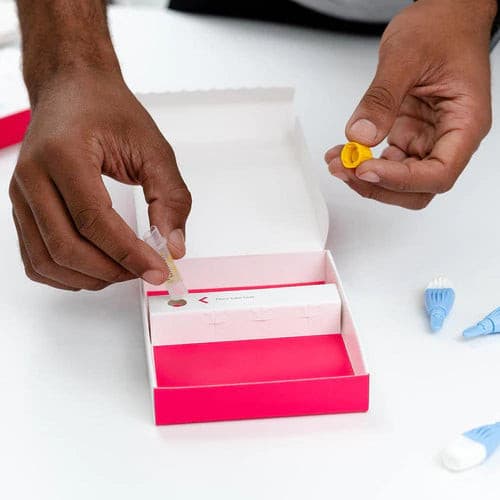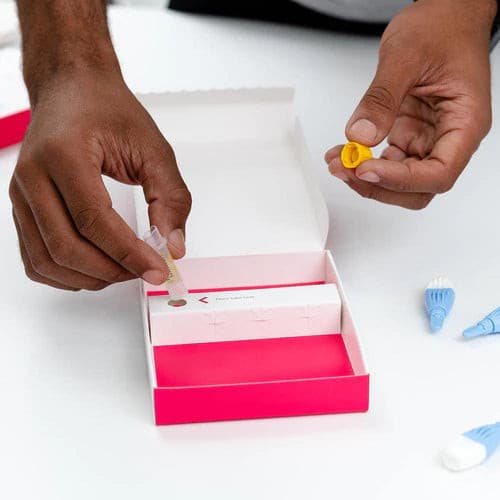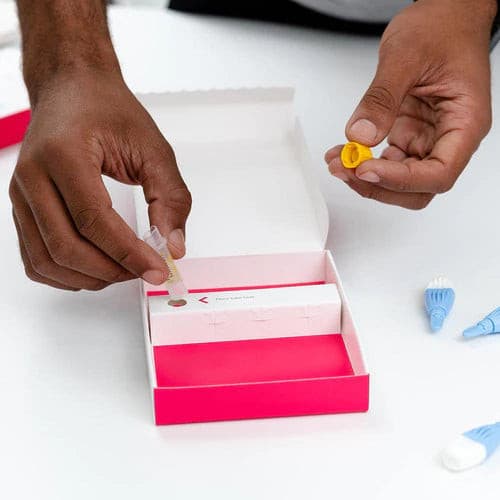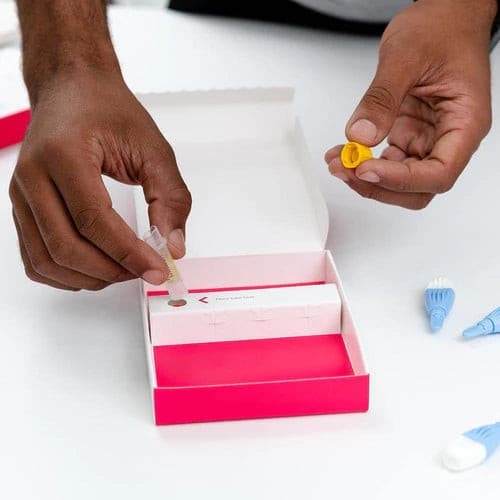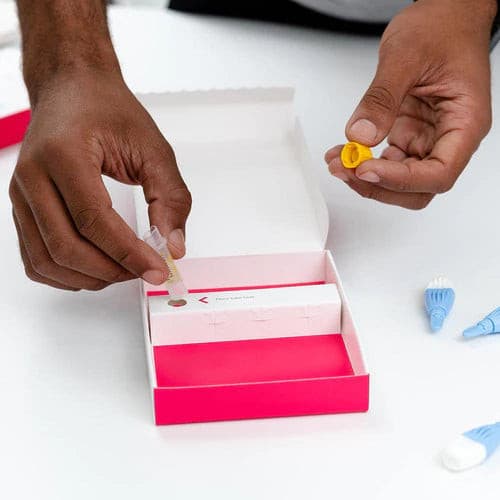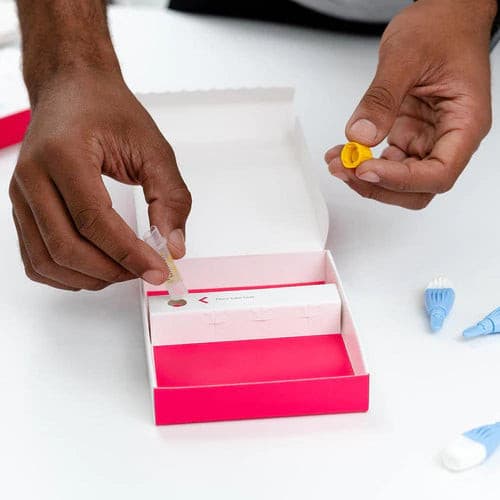
About Description
- symptoms like irregular or heavy periods, weight gain, and mood swings
- thyroid function test and thyroid antibodies
- ideal test for anyone
Why People Choose Us

Quick & Easy
No appointment or long waiting times

Discreet Packaging
Plain packaging with no medical stamps or marks

Confidential Service
Your information stays with us and private payment

UK Medication
Dispensed by registered UK pharmacists
Hormones (6 Biomarkers)
Every bodily function, including development, metabolism, reproduction, and sleep cycles, is controlled by hormones.
Your mood and energy levels, as well as your fertility and libido, can all be negatively impacted by even a slight hormonal imbalance.
Chemical messengers known as hormones are produced in your glands and delivered into your bloodstream. Your body receives instructions from them on how to control your appetite, growth, mood, and reproduction.
In general, they maintain the body's equilibrium and functionality. Hormone imbalances are frequently treated with hormone replacement therapy or by altering one's lifestyle. Throughout the day and for women during the menstrual cycle, hormone levels change.
FSH
The pituitary gland produces the hormone follicle stimulating hormone (FSH), which is crucial for both men and women in the development of sperm and eggs.
FSH increases the growth of follicles within the ovaries in the first half of the menstrual cycle in women. Oestradiol levels will rise thanks to each of these follicles.
Follicle stimulating hormone levels fall throughout the second half of the menstrual cycle as one follicle becomes dominant and is discharged by the ovary (ovulation). In men, FSH stimulates immature sperm cells to mature into sperm by acting on the seminiferous tubules of the testicles.
LH
Oestradiol
Oestradiol is a female steroid hormone that is made primarily in women's ovaries and only little in men's testicles. The female reproductive system, breast tissue growth, and bone density are all influenced by this, the strongest of the three oestrogens.
Oestradiol levels in premenopausal women fluctuate during the monthly cycle, reaching their highest point at ovulation.
Oestradiol levels in women decrease with ageing, peaking at menopause when the ovaries stop releasing eggs.
Hot flashes, nocturnal sweats, and mood swings are just a few of the menopause symptoms that low oestradiol can bring on. Osteoporosis can also result from low oestradiol.
Testosterone
A crucial hormone for both men and women, testosterone controls your libido (sex drive), muscle mass, fertility, and mood.
Prolactin
The brain's pituitary gland produces the hormone prolactin. Its main objective is to increase milk production following childbirth.
Prolactin is known to affect more than 300 more bodily processes in both men and women.
Free Androgen Index
The male sex hormones known as androgens are also found in women. The majority of androgens are protein-bound, which prevents our bodies from using them.
The amount of androgens in your blood that are "free" (unbound), or available for your body to use, is estimated by measuring FAI.
Proteins (1 Biomarker)
Proteins are essential for muscle growth as well as the operation of cells and tissues. Blood proteins are measured to assist in the diagnosis of various illnesses, such as liver or kidney disease.
It is common practise to analyse proteins to determine how much of a specific hormone is bound to a protein or free and thus available to your cells. Proteins also transport other chemicals, such as hormones, throughout the blood.
Dehydration is a common cause of elevated proteins, but they can also be a sign of other health issues. A significant protein deficiency may be a sign of malnutrition or malabsorption.
SHBG
The majority of the sex hormones, including testosterone, oestrogen, and dihydrotestosterone (DHT), are bound to Sex Hormone Binding Globulin (SHBG), rendering them inactive in your cells.
The amount of free or unbound hormones, which are biologically active and available for usage, can be determined by measuring the level of SHBG in your blood.
Thyroid Hormones (3 Biomarkers)
A gland at the front of your neck called the thyroid makes hormones that aid in regulating your metabolism.
Your thyroid may generate too little or too many thyroid hormones, and either situation can cause crippling symptoms. Lethargy, weight gain, dry skin, and hair are typical symptoms of an underactive thyroid, while nervousness and anxiety are typical signs of an overactive thyroid, as well as weight loss.
Once detected, thyroid disorders can be treated, but even then, it's crucial to keep an eye on your thyroid hormone levels to make sure they stay at their ideal levels.
TSH
The thyroid is a gland located near the base of the neck that regulates several metabolic processes, including substrate turnover, heart function, muscle physiology, and energy expenditure.
Thyroid dysfunction can cause either overproduction of hormones (overactive) or underproduction of hormones (underactive), both of which can lower athletic performance. The pituitary gland produces Thyroid Stimulating Hormone (TSH), which stimulates the thyroid gland to create the thyroid hormones thyroxine (T4) and triiodothyronine (T3).
As part of a neuroendocrine cascade, thyroid hormone synthesis occurs. Thyrotropin releasing hormone (TRH) is released first in the hypothalamus, where it causes the pituitary to release thyroid stimulating hormone (TSH).
To release the hormones T3 and T4, this attaches to thyroid gland cells (thyroxine). Additionally, peripheral tissues convert T4 into T3, the thyroid hormone with greater activity.These hormones are essentially what regulate your body's metabolism.
Negative feedback loops typically maintain a tight balance between all of these levels. Thyroid hormone over- or under-secretion can be a sign of abnormal thyroid function. These disorders frequently have an autoimmune component, which can frequently be detected by looking at your thyroid antibodies in more sophisticated thyroid tests.
Free Thyroxine
One of the two hormones that the thyroid gland produces is thyroxine (T4). It accelerates the rate at which your metabolism functions.
The majority of T4 in the blood is bound to carrier proteins, but this test solely measures free, or unbound, T4, which is active in the body.
Free T3
The more active of the two thyroid hormones made by the thyroid gland is triiodothyronine (T3). In the blood, the majority of T3 is protein-bound.
The amount of T3 that is available to control metabolism and is free, or not bound to protein, is measured by free T3.
Autoimmunity (2 Biomarkers)
When your immune system misidentifies your own cells or tissues as "foreign," it begins to attack them, which is known as autoimmune disease.
The parts of your body that are being attacked distinguish a number of autoimmune disorders. Thyroid disease (Hashimoto's Thyroiditis and Graves' Disease), systemic lupus erythematosus (lupus), and rheumatoid arthritis are examples of common autoimmune diseases.
Nobody is quite sure what causes an autoimmune illness, but it is commonly known that more women than men are affected and that your risk of getting one is increased if a family member has one or if you have already had one identified.
Numerous signs of autoimmune disease might either continually be present or flare up occasionally with periods of remission.
Depending on which bodily systems are impacted by the condition, the symptoms change. While other illnesses, like lupus, affect a variety of body tissues, in certain situations the tissue affected is highly specific, such as the thyroid in the case of Hashimoto's thyroiditis.
Thyroglobulin Antibodies
This examination searches for antibodies to thyroglobulin, a thyroid-specific protein. Normal conditions prevent it from entering the bloodstream, but if your thyroid is inflamed or being attacked by your body's immune system, thyroglobulin can be released and antibodies can be found.
The majority of cases of thyroid disease are brought on by autoimmune diseases, in which the body's immune system attacks the thyroid gland. As a result, the thyroid gland may produce more thyroid hormone (as in Graves' disease) or less thyroid hormone as the thyroid gland's cells gradually degenerate (as in Hashimoto's thyroiditis).
Thyroid Peroxidase Antibodies
The thyroid gland produces the enzyme thyroid peroxidase, which is crucial for converting T4 to the physiologically active T3.
This test looks for antibodies to thyroid peroxidase, a sign that the thyroid gland is being attacked by the body's immune system and losing its ability to function.
Easy Steps for your Medicine

Complete a consultation.
With complete privacy and confidentiality your form is checked by a pharmacist independent prescriber.
Choose your treatment.
From the list approved by the prescriber, choose your preferred treatment and then wait for it to be dispensed by UK Meds online pharmacy.
Receive your delivery
With next day delivery options available, you can have your treatment sent out to you discreetly within hours.Our Happy Customers
Rated Us for our Service Excellence
 Dispensed by Regulated UK Pharmacists
Dispensed by Regulated UK Pharmacists

 How it works
How it works Help
Help Account
Account
 Basket
Basket
















